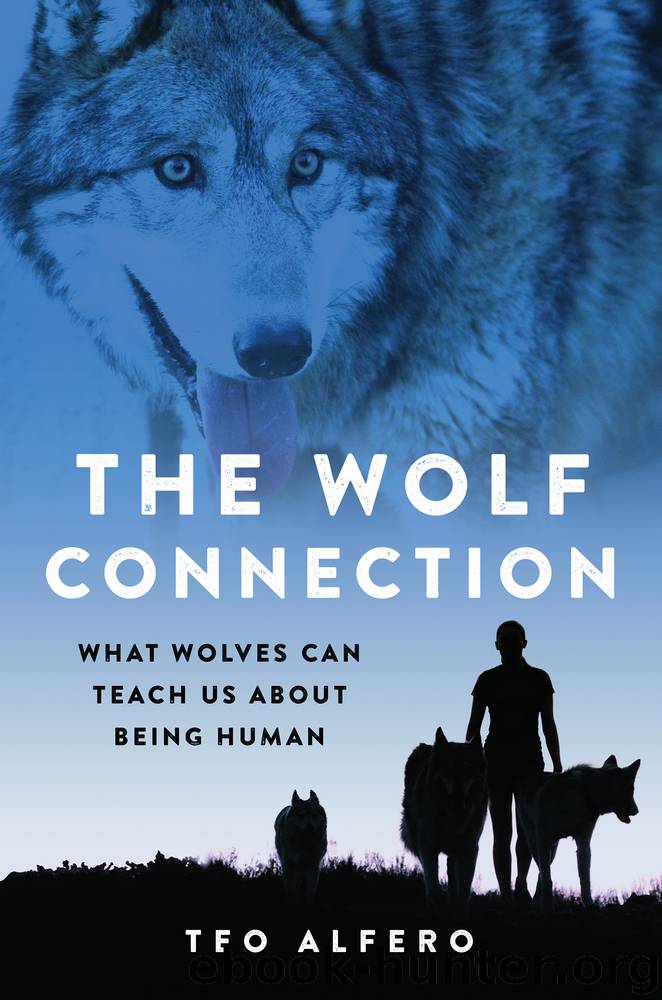The Wolf Connection by Teo Alfero

Author:Teo Alfero
Language: eng
Format: epub
Publisher: Atria/Enliven Books
TERRITORY
Glenn Schiffman, a wolf clan member and friend, shared a traditional Seneca story with me. “It is told . . . that human beings moved to an area and discovered it was the territory of a large wolf pack. They knew that with great effort over a period of years, they could kill all the wolves, but this would make them a changed people, no longer members of Earth’s natural order. So the human beings chose to move away and leave the land to the wolves. In later years, when faced with a critical decision, someone from the tribe would stand up and ask, ‘Tell me my brothers, tell me my sisters! Who speaks for the Wolf?’ ”5 I’d say that’s what it means to be a human being.
Fortunately, there are well-informed, intelligent, and emotionally mature human beings who speak for the wolves today in science, conservation, policy, education, and First Nations cultures. At Wolf Connection we speak for the wolves to shed light on the wolf-human relationship, and to translate the message wolves have for all of humanity. We are passionately committed to embodying heart, and the balance that is possible among all living beings.
Few species are as territorial as wolves and humans. Humans have rationalized war and tried to justify genocide as a defense of territory. We have organized legal and social infrastructure for the management of property, and on a global scale we have destroyed life over territorial claims. In contrast, the Seneca story above speaks of cooperative ways that have been lost, ways from a time when humans and wolves regarded each other as peer predators with a mutual interest to preserve the natural balance of things.
During my 2018 trip to Yellowstone National Park I met with men and women who have dedicated their lives to the protection and scientific understanding of wolves, and in so doing, speak for them as well. Doug Smith, the Wolf Project’s director, is certainly one of those scientists. He and I discussed the wolf-human relationship and the social tensions in northern Europe and North America where wolves had previously been eradicated and are now experiencing population recovery. We both agreed that a deeper understanding of how people live in the areas where wolves have returned, and awareness that humans have encroached into lands already occupied by wolves, could tell us a great deal about ourselves and our society.
Doug referred me to Wolf Conflicts: A Sociological Study,6 the only book either of us is aware of that examines the motivations underlying opposition to wolves’ presence on land occupied by humans. Even though the study was conducted in Norway, I feel strongly that many of the authors’ conclusions, made after a decade of devoted study, can be extrapolated to the reality wolves face in North America. The central causes of conflict are power struggles between local residents and scientific and governmental organizations, which are blamed for forcing wolves into territories in which people live, work, or recreate.7 Wolves are merely catalysts and unfortunate targets of the human social conflict.
Download
This site does not store any files on its server. We only index and link to content provided by other sites. Please contact the content providers to delete copyright contents if any and email us, we'll remove relevant links or contents immediately.
Sapiens: A Brief History of Humankind by Yuval Noah Harari(13053)
The Tidewater Tales by John Barth(12030)
Do No Harm Stories of Life, Death and Brain Surgery by Henry Marsh(6336)
Mastermind: How to Think Like Sherlock Holmes by Maria Konnikova(6236)
The Thirst by Nesbo Jo(5785)
Why We Sleep: Unlocking the Power of Sleep and Dreams by Matthew Walker(5642)
Sapiens by Yuval Noah Harari(4537)
Life 3.0: Being Human in the Age of Artificial Intelligence by Tegmark Max(4507)
The Longevity Diet by Valter Longo(4445)
The Rules Do Not Apply by Ariel Levy(3906)
The Immortal Life of Henrietta Lacks by Rebecca Skloot(3826)
The Body: A Guide for Occupants by Bill Bryson(3802)
Why We Sleep by Matthew Walker(3773)
Animal Frequency by Melissa Alvarez(3755)
Yoga Anatomy by Kaminoff Leslie(3701)
Barron's AP Biology by Goldberg M.S. Deborah T(3632)
The Hacking of the American Mind by Robert H. Lustig(3580)
All Creatures Great and Small by James Herriot(3516)
Yoga Anatomy by Leslie Kaminoff & Amy Matthews(3396)
